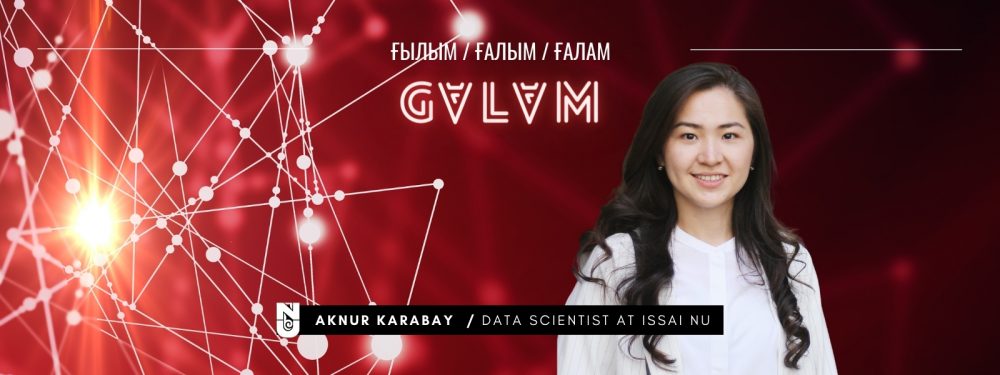“AI is a game-changer, and it has already penetrated almost all spheres of our life”
Our next ‘Galym-Galam’ rubric heroine is Aknur Karabay, Data Scientist at ISSAI. Aknur graduated from NU in 2018 with a Bachelor of Engineering in Civil Engineering. She then entered BI International Graduate programme to obtain industrial experience. Later that year Aknur won a ‘Bolashak’ scholarship and continued her studies at the University of Glasgow, Master’s degree in Structural Engineering. Now Aknur works as a Data Scientist at ISSAI. In our interview, Aknur talked about her research and the opportunities AI brings into our life.
Aknur, tell us about what you do at ISSAI?
Over the last year and a half, I had an opportunity to be involved in several different projects. I started with a project on the integration of IoT and Building Information Modeling using augmented reality.
With the start of the pandemic, our team worked on advanced epidemic simulators, whose data we shared online, and later published in several peer-reviewed journals. At the start of the lockdown last year, we performed simulations for several scenarios. Our estimates were very close to the reality we all faced at the end of summer, 2020. Later, I was a representative member from ISSAI and Nazarbayev University at the epidemic working group under governmental bodies. Where we were performing simulations for different scenarios.
Also, along with a team of young scientists, we now work on a structural design optimization project. In this project, we are trying to optimize the designs of structural elements using neural networks. This model can significantly reduce calculation time and material consumption.
Why did you choose this particular field of science?
I believe that optimization and automatization of the different processes is one of the most important research purposes. These days we see how Machine Learning is penetrating different industries and different aspects of our lives, and it is so exciting to witness. I want to be involved in this process and I hope to contribute significantly, first, to the integration of AI in Civil and Structural Engineering.
Why are AI and Machine Learning important for the industry?
AI is a game-changer. Integration of machine learning models in industry and business is vastly impacting the decision-making process and systems themselves. Intelligent systems are gradually replacing laborious (sometimes dangerous) human tasks and expanding our opportunities, which provides tremendous benefits. We are now capable of working with a massive amount of data and making predictions that further increase efficiency and profitability, bringing fast and accurate results. This also helps us minimize risks in different processes and facilitate efficient usage of resources. AI has already penetrated almost all spheres of our life, for example healthcare, government, transportation, sales, finance, oil and gas etc. In this sense, if correctly used, machine learning can advance the current industry and business much further.
Sometimes people feel intimidated by new technologies. Today many are concerned about AI. Are there any valid reasons for these concerns?
Well, I think the question is quite broad; we should define a context or at what level the question is addressed. It is sometimes a quite reasonable reaction to something new, at least until people get acquainted with it well. Thus, it is essential to increase literacy in this context. AI can go far and make incredible things, but in the end, it is all controlled by a human. And I think that it will take a substantial amount of time until AI gains full human intelligence.
But if we look at different aspects, such as dark AI in cybersecurity, deep fake etc., I don’t have a strong opinion on that. Still, with the enforced strict ethical norms and certain pre-emptive measures, humanity will be able to control whatever may come.
What are your plans for the future?
In the following 3-4 years I plan to continue my work here at ISSAI, deepening my expertise in machine learning even further, and to do my modest contribution to the projects ISSAI is implementing.


